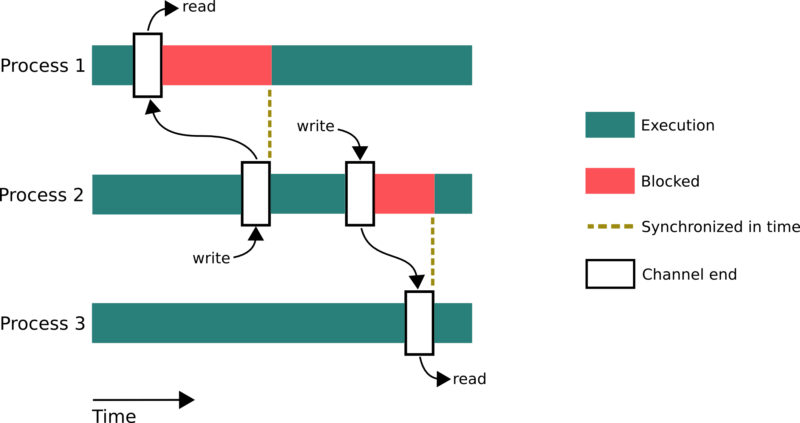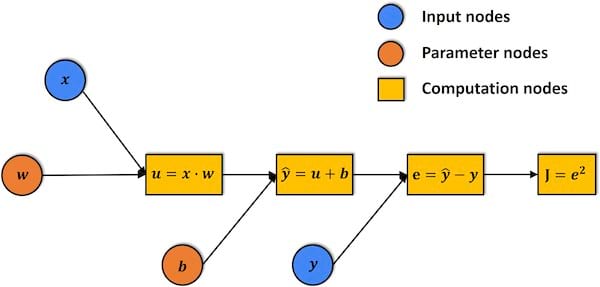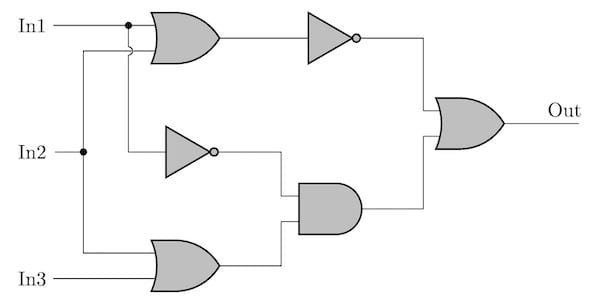1 unstable release
| 0.1.2 | Nov 7, 2022 |
|---|
#19 in #csp
Used in csplib
7KB
219 lines
CSPLib

Communicating Sequential Processes (CSP)
Background
Communicating Sequential Processes (CSP) is a way of writing a concurrent application using message passing through channels. It is practically used in Go's channel for communication between threads.

Computational Graph
The building block of the deep learning is computational graph and it can be implemented as CSP.

Logical Circuit
Logical circuit can be implemented as CSP as well.

Library Design
In the textbook CSP, the writer should block until reader consumes the passing value so as to hold only one value in the channel, which I guess is a good property for mathematical analysis. However, any reader doesn't exist when writer puts a value in the channel isn't practiacally a case. Also, allowing only one reader limits the use case.
So alternatively in this library, writer is never blocked by the reader and allows multiple readers (SPMC) based on the assumption reader is ready when the writer a value on the channel. If any reader doesn't exist, the writer fails.
Example
flowchart LR
Main -->|1| ch1
ch1 -->|1| P1(x+2)
ch1 -->|1| P2(x*2)
P1 -->|3| ch2
P2 -->|2| ch3
ch2 -->|3| P4(x*y)
ch3 -->|2| P4
P4 -->|6| ch4
ch4 -->|6| Main
is equivalent to
#[csplib::process]
struct P1 {
#[input]
a: i32,
#[output]
b: i32,
}
// λx. x+2
async fn run_p1(inner: P1Inner) -> Result<()> {
let x = inner.a.reader().get().await?;
inner.b.put(x + 2)?;
Ok(())
}
#[csplib::process]
struct P2 {
#[input]
a: i32,
#[output]
b: i32,
}
// λx. x*2
async fn run_p2(inner: P2Inner) -> Result<()> {
let x = inner.a.reader().get().await?;
// Emulating expensive I/O
tokio::time::sleep(std::time::Duration::from_secs(5)).await;
inner.b.put(x * 2)?;
Ok(())
}
#[csplib::process]
struct P3 {
#[input]
a: i32,
#[input]
b: i32,
#[output]
c: i32,
}
// λxy. x*y
async fn run_p3(inner: P3Inner) -> Result<()> {
let x = inner.a.reader().get().await?;
let y = inner.b.reader().get().await?;
inner.c.put(x * y)?;
Ok(())
}
let (main_w, main_r) = channel();
let (p1, p1_inner) = P1::new();
let (p2, p2_inner) = P2::new();
let (p3, p3_inner) = P3::new();
tokio::spawn(run_p1(p1_inner));
tokio::spawn(run_p2(p2_inner));
tokio::spawn(run_p3(p3_inner));
tokio::spawn(connect(main_r.reader(), p1.a));
tokio::spawn(connect(main_r.reader(), p2.a));
tokio::spawn(connect(p1.b.reader(), p3.a));
tokio::spawn(connect(p2.b.reader(), p3.b));
// Wait for all spawnings.
tokio::time::sleep(std::time::Duration::from_secs(1)).await;
main_w.put(1).unwrap();
let ans = p3.c.reader().get().await.unwrap();
assert_eq!(ans, 6);
Dependencies
~2MB
~46K SLoC